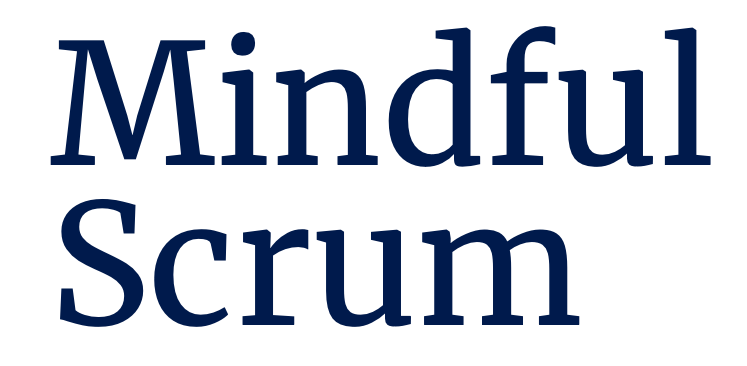Motivation
The digital transformation is increasingly accelerating the complex and dynamic competitive environment of organisations (Baran and Woznyj, 2020; Mack and Khare, 2016). To address this situation and remain viable, organisations are increasingly implementing agile approaches. Along with that, agility is becoming a key success factor (Overby et al., 2006). Agility describes the ability to sense and adapt effectively to changing conditions and is under investigation on the individual, team, and organisational level (Sherehiy et al., 2007; Tallon, 2019).
Scrum is the most widespread and increasingly used agile methodology in organisations (Digital.ai, 2020). Methodologies and tools are structures that externally influence the way individuals and teams work and can be summarised as aspects of ‚doing agile‘. On the other hand, aspects of ‚being agile‘ form the way individuals, teams and organisations perceive, evaluate and interpret work in a volatile environment and thus influence their behaviour (Eilers et al., 2020).
Higher agility has been shown to correlate strongly with better performance, empowerment, competence development, customer orientation, and job satisfaction in an organisation (Peters et al., 2020). Therefore, many organisations are trying to increase their agility but face challenges in the agile transformation process (Dikert et al., 2016). In a comprehensive survey almost half of participants answered, that not all or almost all agile projects are successful and the biggest challenge is related to organisational culture (Digital.ai, 2020), which is one aspect of ‘being agile’ on the organisational level (Eilers et al., 2020).
Aspects of ‘being agile’ are still insufficiently investigated. First results have shown that the agile mindset (being agile) seems to be relevant and that the use of methods and tools (doing agile) alone is not sufficient (Eilers et al., 2020; Peters et al., 2020). Further insights offered, openness towards agile way of working of those involved as an important aspect of ‘being agile’ (Baumgart et al., 2015; Dikert et al., 2016; Eilers et al., 2020; Lee, 2012).
So far, there is little research on how the interaction of ‘being agile’ and ‘doing agile’ can realise positive benefits and how to improve aspects of ‘being agile’ in Scrum teams.
Theoretical Basis
Research has shown that mindfulness practice has, among other factors, positive effects on openness, which is an agile value of Scrum as well as a success factor for ‘being agile’ (Eilers et al., 2020; Mielke, 2021). Therefore, it seems reasonable to conclude that the positive benefits could be an approach to overcome challenges and support success factors of ‘being agile’ in Scrum teams.
Mindfulness refers to an awareness and receptive attention to present events and experiences (Yu and Zellmer-Bruhn, 2018). Studies in neuroscience showed the diverse benefits of individual mindfulness practice (Tang et al., 2015), and mental training, especially as different mindfulness techniques have been shown to have specific effects on focus, creativity, resilience and empathy (Böckler et al., 2018; Trautwein et al., 2020).
Other studies showed the benefits of collective mindfulness in organisations and refer to the benefits of mindfulness in the workplace (Hülsheger et al., 2013), mindfulness in teams (Yu and Zellmer-Bruhn, 2018), and critically examined mindfulness in organisations (Rupprecht et al., 2019).
A study in Scrum teams showed that mindfulness practices have a positive influence on the effectiveness of stand-up meetings (den Heijer et al., 2017). However, their study is limited to stand-up meetings. Subsequently, further research is suggested (den Heijer et al., 2017).
Further studies have shown that the benefits of mindfulness for organisations as a whole can only be realised if mindfulness techniques are practised regularly and that this is the biggest challenge (den Heijer et al., 2017; Mielke, 2021).
These findings suggest that the clear framework of Scrum should be complemented by mindfulness practices to establish a regular mindfulness routine to overcome existing challenges and support ‘being agile’ in Scrum teams.
This leads to the following Research Questions:
RQ1: How can mindfulness help to overcome challenges in Scrum and support Scrum teams to ‘be agile’?
RQ2: How can a regular mindfulness practice be integrated into Scrum teams?
Methodology
To answer these two questions, a literature review will first be conducted to explore existing challenges of ‘being agile’ in Scrum teams and how mindfulness can contribute to overcome challenges and support success factors.
This is complemented by qualitative research with a focus group with expert discussion (Morgan et al., 1998), which will be recorded and transcribed to analyse the content qualitative. Finally, the results are evaluated and discussed to answer the research questions.
Envisioned Results
It is expected that this research will reveal practical implications of integrating mindfulness practices into Scrum and how they can help overcome challenges and support success factors as well as improve the ability of Scrum teams to be agile. This will form the basis for further research in this area.
